Using Target Time Information
Each Target Time record contains targets for one Person for a period of time. In the example illustrated below, that period of time is a week. These targets will apply every week until a new Target Time record is entered.
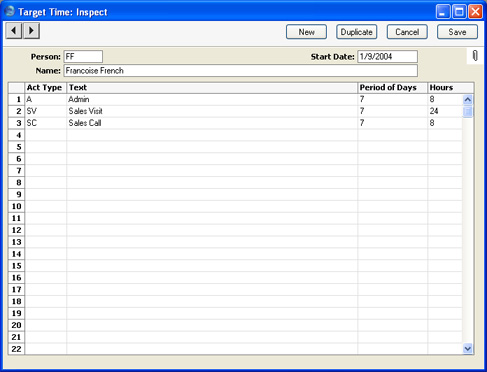
Each Person should record the work actually carried out by entering Activities. Continuing the example shown in the illustration above, when the employee in question (Françoise French) spends a day making sales telephone calls, she should enter an Activity recording the details of her day's work. For the example, Françoise enters
Time Activities where the Task Type is Calendar recording her work as the week progresses. They are visible in Françoise's Calendar:

As always with Activities, a consistent and planned approach to the Calendar Type options (Time, Profile and Don't Show) is recommended. This process can be helped by attaching each Activity Type to an Activity Class in which the correct option has been selected. This will mean that Activities with a particular Type will always have the same Calendar Type selected by default, reducing the chances of error (i.e. ensuring they will be taken into account correctly by the various reports).
At the end of the week, an Employee Time Statistics report can be produced. This report in the CRM module can compare the target time recorded in the Target Time register either with actual time recorded using Time Activities or with planned time recorded using Profile Activities. The accuracy of this comparison relies on the correct Calendar Type (Time or Profile) being selected as appropriate, and on the Task Type being set to Calendar in these Activities.
In the specification window for the report, the week in question is entered as the report period and Françoise's initials are entered in the Employee field. In the example, we will compare Target Time with actual time, so Target/Actual is chosen as the Comparison:
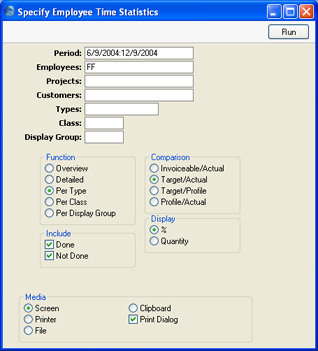
To make the comparison, the report searches for Activities whose Start Date falls in the report period and for the Target Time record applying during the report period. This is the Target Time record with the most recent Start Date prior to the report period. The Per Type version of the report provides a concise analysis of the hours spent working on each Activity Type:
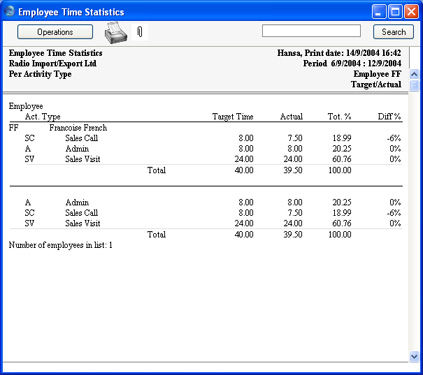
The Diff % column in the report shows that Françoise met her targets for Admin and Sales Visits, but fell slightly short of her target for Sales Calls. The Tot % column shows the percentage of actual time spent on each Activity Type.
For the next week, there is no need to enter a new Target Time record, providing the duties of the employee have not changed. The original record will be used by the report once again. Françoise continues entering Time Activities to record the work carried out. The report for the second week can be produced as described above.
A report can also be produced for the two-week period:

In this report, the Target Time is calculated using the formula:
| Target Time = | Hours (from Target Time row) x days in report period |
| Period of Days (from Target Time row) |
For example, the Target Time for Sales Visits is 24 x 14/7 = 48.
So a single Target Time record covering one week has been extended so that it applies to the whole two-week period.
On Wednesday in the third week, Françoise's duties change. The eight hours per week that she did spend making sales calls is now to be spent on sales management. A new Target Time record is entered for her, dated Wednesday 22nd September:
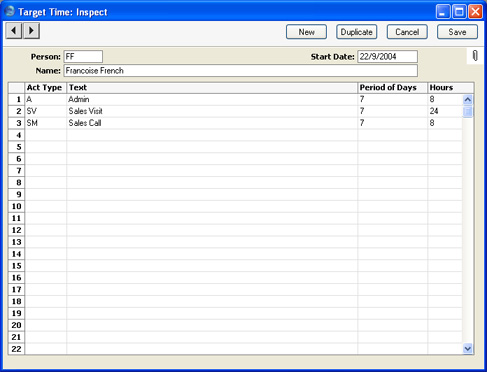
The
Employee Time Statistics report for this third week shows the change. The report still contains a target for sales calls, for the first two days of the week, because the new Target Time did not take effect until Wednesday. Similarly, the target for sales management is reduced proportionally because this applied to the second half of the week only:
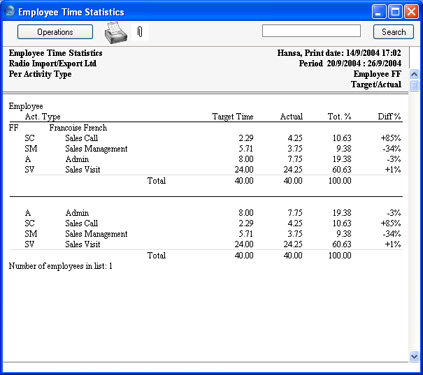
This new Target Time record will be used to set Françoise's targets from September 22nd onwards, until her duties change once more. Both Target Time records will be used when the
Employee Time Statistics report is produced for the month of September.
